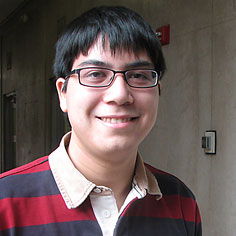
Victor Bass (S 2014)
Biological Sciences major, SRI participant, TutorNet volunteer
Bio
Getting a Jump-Start
Think of boot camp and you might conjure images of trainees struggling through push-ups, jumping jacks and crunches. You probably don’t think of culturing bacteria, tagging proteins with fluorescent markers and running proteins on gels. But that’s just the kind of boot camp Victor Bass went through the summer after his first year at Carnegie Mellon.
Bass and eleven of his fellow trainees spent ten weeks working on beefing up their laboratory skills—and conducting original research—in the Summer Research Institute, a program at Carnegie Mellon that exposes undergraduates to scientific research at an early stage in their college experience.
It was just what Bass was looking for.
“I really like the fact that research is a big part of life here. I know in the Mellon College of Science, the majority of undergrads do research at some point. That was one thing that really got me excited about coming here,” said Bass, a New York City native and sophomore biological sciences major.
Once Bass got a taste for research, he didn’t want to stop. He’s now working with Professor Jon Minden, who created a tool for spotting subtle differences in protein expression in cells. When Bass first heard Professor Minden talk about the tool, called Difference Gel Electrophoresis (DIGE), he knew that he wanted to work in his lab.
“He was explaining how he was borrowing techniques from astrophysics to help with his work on biology. And that part made me go: Wow, that’s really cool. That’s the guy I want to work for,” Bass said.
Different proteins are expressed at very different levels in cells. When all the proteins in a cell are labeled with a fluorescent dye and run on a gel, light from highly expressed proteins can drown out light from other proteins nearby. Astrophysicists run into a similar problem when observing stars in the sky: light from bright stars can drown out dim ones. They solve it by using techniques to mask the light from the bright stars. Professor Minden has been adapting these techniques to improve DIGE.
In Minden’s lab Bass is helping to test possible improvements to the DIGE procedure that will make it more sensitive to large differences in protein concentrations.
This summer, with support from the Howard Hughes Medical Institute, Bass will continue working with Professor Minden on a project involving cancer cells. He’ll be using DIGE to help analyze how the proteins in different types of leukemia cells react to a chemotherapy drug.
For Bass, who wants to pursue a research career in biochemistry or cell biology, getting a chance to work on original research projects is exciting.
“I like the fact that we are doing something where we can’t just go and search for what the right answer is going to be. It’s a really fun process.”